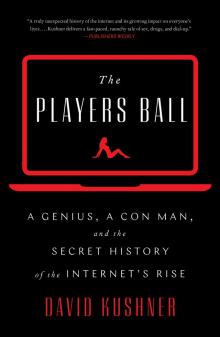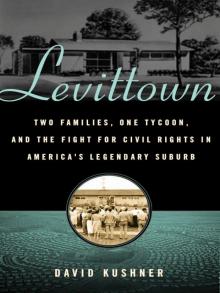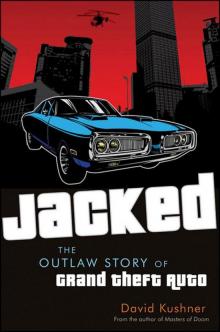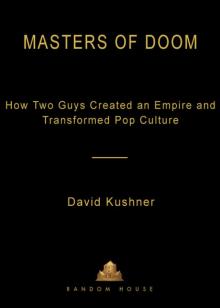- Home
- David Kushner
Alligator Candy Page 4
Alligator Candy Read online
Page 4
The death temporarily derailed what had been the rapid ascent of my father’s career. It was the fall of 1973, the academic year having just begun. His anthropology department, which he chaired, was ramping up for its graduate program in applied anthropology to begin the next fall. But for untold weeks, that was gone. The professors and students would fill our house, offering whatever they could to support us. The house was full so often—full of food, full of love, stretches of silence, and tears.
I didn’t know that my mother and father had cut a deal with each other. If one of them began to cry, the other would be there for support, and vice versa. They would be there for each other. But it was too painful to talk about Jon. Down the hall, his room remained shut.
13
MY MOTHER would be the one to finally open Jon’s door for good. But it would not come easy. The interminable week when Jon was missing had been a nightmarish blur for her. There was the moment she felt something was wrong when she came home to find Jon still away, and the flash of anger toward my father for not having been aware. There was the crush of people in the house, the strange pull of playing hostess to the ones that passed through—friends, strangers, police—and being hosted by these people in her own home, too, when she didn’t have the strength. My mother, who’d made a life bringing babies into the world, would be remembered that week for the warmth she showed to the people in our house, the way she made them feel comfortable and welcomed, even those we didn’t know.
But there was the horror and the pain, the widening chasm of fear as each day ticked by without Jon coming home. The few moments that I remembered—when the policemen found his bike, when the radio said our name—were lost in the dark swirl of madness that she felt enveloping her, the insanity that crested with the news that her child had been found dead.
But it wasn’t only Jon who had died that week. It was something in my mother too. She would look into her bathroom mirror and not recognize her face. She would burst into tears as my father comforted her, and then be comforting him the next moment. She felt at sea, occasionally drifting back to check on Andy and me, to console me during one of my tantrums, or to try to reach Andy, who was pulling further and further away.
She moved through the days and nights, fulfilling her responsibilities as best she could. At some point when Andy returned to school, she would drive him to rehearsals with his school concert band. As she watched him walk into school with his trumpet case, she so wanted to connect with him, to talk about Jon, to have him share, only to see that moment dissipate.
She and my father had been following the psychologist’s advice on how best to deal with Andy and me. Within a few weeks of Jon’s death, the psychologist thought it was best for him to know the details of the murder, which he shared with Andy himself. As for what, if anything, was shared with me, no one—not me, nor my parents—would recall later. All they could remember was that when the doctor suggested that my frequent outbursts be treated with tranquilizers, they followed his advice.
This was a time when therapy for children wasn’t common, and even my parents, for all they knew, didn’t know enough to have me in treatment. But my mother would hug me hard, like Jon used to hug—he was known for his tight grip, consciously transferring his energy to me—thinking, David will hug like Jon did. But she knew I was fighting demons of my own. One day I drew a picture of dark woods with an owl and the words Don’t Go.
Just as my mother had encouraged my father to finish his graduate degree after he was dismissed from the University of North Carolina, she took the lead in helping us heal. She took me to see an educational filmstrip about death at the community college where she had been teaching childbirth classes. As a stoic voice-over played, the cartoon stills told the story of two boys who were off playing in the bushes when one was stung by a bee. The boy was allergic and died, leaving the other to sort out his feelings. I didn’t know what to make of the story. On one hand, it left me feeling like I was not alone. But it also left me feeling like I was in a very small and strange club that my mother understood as she sat beside me.
While my dad was more inclined to keep the blinds in Jon’s room shut, my mother was the one who opened them first. She put a desk in there, and begun using it as her office: books on childbirth, a demonstration pelvis, a monkey mom doll with a baby and a placenta. Jon’s wallpaper remained, along with his posters. On one wall was a peace sign, in red, with Hebrew lettering against a blue background. The words were the hymn “Hine Ma Tov,” and the translation ran across the bottom, “Behold How Good and How Pleasant It Is for Brothers to Dwell in Peace.” On another wall was Jon’s poster of a boy on a white horse by a lake.
One day, six months after Jon’s death, she found herself writing on a yellow legal pad. She’d been keeping a diary most her life, dating back to her childhood in Minneapolis, the little brown or red books written in blue cursive. But now she sat at her typewriter with a new kind of urgency: to put down on paper her memories of Jon, to keep them alive. It was as if she couldn’t write fast enough, couldn’t commit them to paper in time before they vanished like invisible ink.
I see them returning together. My 3 sons, they’re so proud of David. Oh God, let them remember Jon, his sweetness, their brother. It feels good, though, I cry, to write about him, to gather my thoughts and memories together about him. I need to hang on to the memories, the special little things, the everyday feelings we had for him. To forget these things would add to our loss. What do we have but some pictures, the things he made set in his room, our little den now, throughout the house. When will we be able to put up his pictures . . . How many more birthdays (my last one was so painful without him) before I begin to not miss him or think—“he’s not here.” Will that ever happen? Do I want that to happen? Yet how long can we live—I live—having the pain of it happening?
I want more memories to come to me. I want those who loved him, played with him, got a kick out of him, to write down some memories of him, to add to these.
I see him wiping his finger across his nose. I did that, too. Did he learn that from me? I see him sniffing up, lip slightly down in a sort of habit-like manner. I see his twinkling, twinkling brown yes. I see the little blackhead on his right cheek near his ear. I long for this kid, my Jon, part of me.
I think that my grief might keep me from Andy and David, lessen my time and commitments to them. That would be so unfair, not right. But my grief separates me from my wholeness now. Maybe time will help. More memories: Our stay at the Sandcastle, St. Pete. He and Andy running from pool to pool, enjoying.
Lying in the back of the wagon (on pillows for a while) taking lots of books, comics to read whenever we would drive somewhere. Andy did that, too. Now David does.
The time Gil, Andy, David, Jon, and I rode our bikes (David on mine) to the park, the ducks, the swings.
The time I look out the garage and see Andy’s head barely above the Toyota steering wheel with Jon seated next to him driving slowly past the mailbox.
Trying to play the drums, little quick repetitive hits on it. He wanted to take lessons.
Last Yom Kippur. He would get so tired at evening services. He begins to fall asleep, his head leans on my shoulder . . .
His last birthday party, some friends go with him to Shakey’s. He liked that a lot. Presents, his own pizza, a Shakey’s hat. I hear and see his giggles, he walks fast, his arms swinging, his toes pointed in a little.
Tomorrow is Passover. Last Passover, together here in our new house and Jon here. How many holidays will pass and will his presence not be so missed?
[Our friend’s] house, one Sunday last summer. Jon went out on their kayak. He paddles and maneuvered around. He dragged it up on the ground. He was so fervently busy and absorbed.
To remember and see him in all those places. That is what I want now.
And Busch Gardens, see him and Andy dashing up and around to go on the flume ride.
Andy said after Jon’s death, “Now I don’t have
a brother to do things with.” He also said, “Did he know I loved him?”
14
SOON I WAS walking down the same sidewalk where I last saw Jon, and wandering to school alongside the woods where he vanished. Jon was gone but everywhere. He was in the woods across the street from our house. He was in the 7-Eleven that we passed frequently. He was at IDS, in the trees and the Dome. He was in our den, where his last school picture hung next to Andy’s and mine against the wood-paneled wall. That picture of him took on great meaning. It was the one that I would see periodically in news stories about his case. My brother wore a red shirt, zipped up to the neck, red like his hair. Red became the color of Jon. Red, the color of his pop art wallpaper. Red like his bike. Red like blood. Red like fire ants. Red was everywhere, and so was my brother. When I was given something of Jon’s as a keepsake, it was his lucky rabbit’s foot. And it was red too.
It was still the early seventies, and even Jon’s murder didn’t seem to hamper the sense of freedom that the other kids and I felt at IDS. The nightmare had left us shaken but with an even greater appreciation of what it meant to be alive. This sentiment was written into the school yearbook from 1973. A full page is dedicated to Jon, and shows a black-and-white picture of him against a black background. Jon stands barefoot in front of our house, arms at his side in a white muscle shirt and shorts, head tilted, smiling. The final page of the yearbook shows a photo of a long-haired girl named Betsy, kneeling by IDS’s cypress-lined pond, leaning back against her mud-crusted Converse sneakers, hands in her lap, staring up at the sky. The text of a poem that she had written in the wake of Jon’s death appears above her. It describes the natural wonders around her and concludes: “Death whispers in my ear; I look once again to see. Life is beautiful.”
Life was beautiful at IDS. After starting kindergarten there in 1974, I spent my days drifting between the brown circular pods for classes, passing peacocks in my path. A pony-tailed teacher in a flowered skirt taught us how to sauté green beans and onions. We sculpted pottery and fired it in the kiln. A skinny, funny hippie with a long beard taught us how to make whistles from clay. At nap time, we stretched out on thickly woven fringed mats.
Greater freedom awaited us outside on the vast wooded lakeside acreage. There didn’t seem to be any limit on how far we could go for recess and lunch. Every tree begged to be climbed. We conquered one tree at a time, and each had its own personality: the fat oak on the main field with the thick gray branches that shot out horizontally, the tall, straight cypress with the rough, scratchy bark. Down by the lake, we pulled ourselves up the melaleuca “paper” tree, a twisting Tolkien-esque giant with a papery bark.
There was a palpable collective energy during free time, a self-organizing tribal urgency that took over my friends and me as we set off on our missions. The moment the door of our pod opened, we’d sprint into the woods, grabbing long sticks and preparing for whatever it was we were to accomplish that day. There were forts to build, treasures to hunt, every knot in every tree a place of hidden fortune.
I fashioned myself as leader of the adventure club. One day I convened my legion to excavate a knothole that, I imagined, housed a giant lost diamond. You could see the diamond down there, I said, if you backed up and stood in the right spot. My friends Michael, Kevin, and Robbie elbowed each other for a look, and claimed they saw it—the glimmer of light reflecting off the crystalline shard. The fact that the glimmer was actually coming from an old sandwich bag didn’t faze us; it was a diamond if we said it was.
The explorations didn’t come without risk, which made our capers all the more exciting. We could plummet out of trees, eat a rotten kumquat, fall into the lake. But we never heard any mention of words like liability and lawsuit from the teachers; everything was fair game. Most of the danger came in the form of fire ants, nasty little red stingers that burn when they bite. The fire ants were everywhere, scurrying over one another in giant gray mounds of sand that dotted the fields and the bases of trees like camouflaged land mines. Once, I slid down a slide right into a huge pile of ants, much to the delight of my friends. But the teachers kept bottles of calamine lotion on their shelves, and the pasty, cool swabs on my skin made everything okay.
If the teachers were giving me special attention because of Jon’s murder, I wasn’t aware. No one ever said anything or asked how I was doing, not that I expected them to or even desired this. They treated me like a bomb they didn’t know how to defuse, so they just left me alone. I made it relatively easy for them. Despite what had happened, I was generally a fun-loving and easygoing kid, eager to entertain if not be a bit precocious. Sometimes I’d lash out, throwing a tantrum that the teachers seemed to regard as something to be expressed, not contained. Rather than telling me to stop, they would hand me a hammer and a block of wood and tell me to go get out my anger. So there I would be, standing outside the brown round pod, banging a hammer against the wood until someone told me to come back inside.
Eventually I learned my own coping technique on the schoolyard. It started after kids would come up to me and repeat rumors they had heard about how Jon had been killed. Because I still didn’t know the whole story, I had no idea what to believe. Even the most outlandish suggestions could be true. They said he had been cut up and put in a pickle jar, and that he had been shot with bows and arrows. At first, I would just stand there not knowing how to respond. I pictured a boy in a pickle jar, like something out of a Flat Stanley children’s book, and it didn’t make sense.
I took solace telling myself they were wrong. My mind clung to the sparse details that I’d retained: he’d been hit in the head, suffocated, that was that. Everything else was just a lie, some crazy rumors that filled my classmates’ heads. Perhaps I actually took the time to respond to them at first, insisting that, no, you’re wrong, nothing like that happened to him. But my responses were not convincing enough, because the rumors, as the months went on, kept resurfacing. Finally, I’d had enough, and decided to simply shut down completely in these moments and act like I couldn’t hear them.
In that silent space, the world around me would blur and fade—the sounds, the colors, the trees. I was just walking through a thick translucent jelly, isolated, alone. I didn’t want pity, my stomach turned at the very thought. To be pitied was to be denigrated; to be singled out as “different.” I wanted disregard. I wanted to be just like every other kid around me, seemingly unburdened and intact. I didn’t want to be the star of a crime drama; a murder mystery that was fueling all kinds of conversations in the homes of my friends. Every day, on my way to school and back, I would pass the woods where Jon had disappeared. And at some point, a thought occurred to me: perhaps if I hadn’t asked Jon for the alligator candy, he would never have gone that day, and he would still be alive.
15
ANDY GREW a giant afro. Even for the midseventies, it was impressive, especially on a white Jewish teenager in the suburbs. The hairdo struck me as an architectural marvel, and I used to watch him tend to it in the mirror of our bathroom. It started out long and wet, but then he’d have at it with his wide black hair pick, flicking and snapping over and over and over again until it dried into a frizzy, dark dome that, if it possessed self-luminescence, would have passed for one of those party lights at Spencer Gifts.
Afros seemed to be everywhere in those days, from Sly Stone and Dr. J to the cast of Welcome Back, Kotter. For Andy, the Jewfro was all about the music it conjured, jazz and funk, and his passion for playing the trumpet. Day and night, I’d hear him behind his closed door, practicing scales on his horn. Before long, there were other skinny, white, nerdy funksters in our house, pushing around the living room furniture so they could practice together.
Andy named his band Rhythm and began getting gigs around town. Every weekend, we’d pile into our station wagon and head for Shakey’s Pizza Parlor, where Rhythm had a regular show. The station wagon was the perfect roadie vehicle. It was roomy enough to cart the instruments and, for a reason that escaped m
e, had a mushroom decal by the gas tank. Andy made a point of letting me help the band set up.
As Andy and the band made their way through Dixieland songs, heavyset Southerners—men in trucker hats, women in plaid shirts—would swill their pitchers of beer and hit the dance floor. At some point, Andy would lead a few contests for the kids in the crowd. I went onstage for a balloon-blowing competition, but, shamefully, broke into tears when another kid popped his balloon first.
Shakey’s led to Andy’s best gig: being the house band at Tampa Stadium, the seventy-two-thousand-seat arena where the Rowdies soccer team played. Soccer was huge at the time, especially in the years before Tampa got a pro football team, and I’d dart between seeing Rodney Marsh play Pelé on the field and seeing Andy play a song by the group Chicago. Andy became just as famous at shul, where he was the designated shofar blower on the high holidays, the yarmulke pinned precariously to his Jewfro as he held the tekiah gedolah—the longest note of the service—for what seemed like forever.
Throughout it all, Andy and I seldom, if ever, discussed Jon. We were acclimating from being three brothers to two. He still had a little brother, and I still had a big one. But we knew who was missing in the middle, just like Jon’s missing name on the sidewalk in front of our house. But this downsizing became a quiet, personal conundrum for me every time some new person I met asked me how many siblings I had. The question swirled inside my head for years: Should I say one or two brothers? Should I say I had two brothers but now I have one?

 The Players Ball
The Players Ball Alligator Candy
Alligator Candy Levittown
Levittown Jacked: The Outlaw Story of Grand Theft Auto
Jacked: The Outlaw Story of Grand Theft Auto Masters of Doom
Masters of Doom